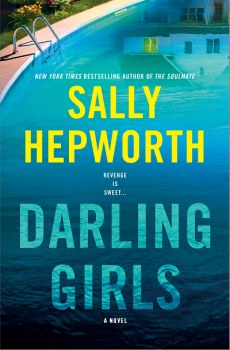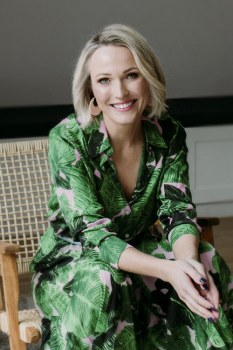What Does “Lucky” Mean to You?
The Big Thrill Interviews Bestselling Author Sally Hepworth
By K. L. Romo
 Bestselling author Sally Hepworth takes us into the heartbreaking world of life in foster care in her newest thriller, DARLING GIRLS.
Bestselling author Sally Hepworth takes us into the heartbreaking world of life in foster care in her newest thriller, DARLING GIRLS.
Life on the outside looks drastically different from life on the inside at Wild Meadows Farm in Port Agatha, Australia—a foster home run by the delightful Miss Fairchild. Yes, Miss Fairchild thought of Jessica as her daughter when she came to live with her at four years old. But as the years pass, finances become tighter and tighter, so Miss Fairchild takes in two more foster girls, Norah and Alicia. They are her “Darling Girls.”
Wild Meadows Farm should be a dream come true for the girls—all the powers that be think so. But Miss Fairchild enforces her strict “Mommie Dearest” cleaning schedule for everyone, and the girls are half-starved. The trauma they suffer at the hands of Miss Fairchild bonds them into sisters, closer than any bio siblings could ever be.
Then the babies come.
Now, 25 years later, the bones of a child are found under the floorboards at Wild Meadows, and Detective Ashleigh Patel arranges to meet Jessica, Norah, and Alicia there to give statements—the small bones buried under the house shock everyone. Well, everyone but the three girls—they suspect they know who it is. But their long-held secrets will soon be twisted into a new reality.
Hepworth pays homage to foster children, and both the trauma they bring with them and the trauma many suffer at the hands of neglectful or abusive foster parents. Through the women raised in Australian foster care she spoke with, she came to “appreciate the feeling of bewilderment, displacement, and powerlessness that result from being taken away from your home and placed with strangers when you are a young, traumatized child.”
But she also appreciates the “heroes” of the foster care system. And while many kids in foster care feel “lucky” that their foster parents are kind or lucky they don’t suffer abuse as much as others, there is nothing lucky about being in foster care.
Hepworth’s characterizations give her audience both a heartbreaking account of a broken system and a compelling portrait of her characters’ resilience and determination to overcome their past trauma.

© Mrs. Smart Photography
The Big Thrill was pleased to chat with Hepworth about why she focused on children in foster care, the subjective meaning of the term “lucky,” and why humor is a saving grace.
What inspired you to research and write about the relationships between foster children?
I love writing about dysfunctional families—I have explored a lot of different relationships in my books—but prior to this book, never foster families. While I contemplated writing about it, a friend of mine told me about a woman she knew who was fostering two little boys. I peppered her with questions about them, and among my favourite anecdotes was the fact that the boys—who were not biologically related—called themselves ‘brothers.’ I thought that was so beautiful and intriguing. So, I developed a story about three women who grew up together in foster care and became bound for life as sisters.
You note in your acknowledgments that many fosters receive much less than children deserve, but they consider themselves “lucky” if their abuse has been minimal. Can you comment more about this?
While this book was in its infancy, I had the privilege of speaking with a dozen women raised in foster care. These conversations were incredibly powerful, perhaps most so because of each woman’s unprompted assertion that she was lucky. At first, I thought this was a good thing. I thought perhaps it was this optimistic attitude that allowed them to survive and thrive in their lives. But as we talked further, I realised the opposite was true. Each of these women had received so much less than any child deserved. That on top of their trauma, they were required to consider themselves lucky, felt like perhaps the biggest betrayal of all.

What was the most shocking thing you learned through your research into foster care?
The number of children who go missing from foster care is astounding. Many are left fending for themselves, put into abusive situations, or even trafficked.
It’s horrifying to see the way these children can slip through the cracks of the system. Frequently, it comes down to a lack of funding and a lack of trained foster carers. There are also, of course, incredible people working behind the scenes to make the system better, and I am so grateful to the foster parents and social workers who took the time to speak with me.
On your website, you “acknowledge the traditional custodians of the land on which I live, work and play.” Can you tell us more about this statement?
Australia is a country built on colonisation and displacement of indigenous people. For thousands of years, Aboriginal people cared for the land before white settler colonies displaced them and then excluded them from history books, not to mention democracy, for far too long. So, having that statement on my website and in my email signature is my way of recognising and showing respect for the unceded land where I live.
What messages would you like readers to take away from the book?
For every villain in the foster care world, there are a hundred heroes working tirelessly to help these kids and fight this broken system. We need more heroes. These children belong to all of us, and as long as the system is failing, so are we.
Why is it important to you to insert humor into dark stories?
The shadows are the most interesting part of life, but personally, humor is how I survive the tough stuff. It keeps me going! I would be nowhere without my sense of humor, and it’s probably my favorite way of connecting with readers and my community of wonderful followers on social media.
Do you have any advice for aspiring authors, especially in the thriller genre?
I know it’s the most cliché thing of all, but just start writing, and don’t stop! Collect ideas from everywhere…there is so much incredible fodder for stories, just in our daily lives. Listen to the news, dive deep into documentaries, and figure out what inspires you. It’s also important to learn how to properly plot your story and keep it page-turning for readers. Save the Cat! is one of the most accessible books about story structure that I recommend reading.
Can you share a teaser about what you’re working on now?
My next book is, of course, about dysfunctional relationships with a side of murder. That’s all I can say for now!
Tell us something about yourself your fans may not already know.
I’m a true introvert…despite what it might look like online. Yes, I love trying on clothes and making videos for Instagram, but I’m happiest at home in my pyjamas. I’d live in my bed if I could!
The Big Thrill Interviews Bestselling Author Sally Hepworth
- The Big Thrill Recommends: ONE BIG HAPPY FAMILY by Jamie Day - September 16, 2024
- The Big Thrill Recommends: ONLY ONE SURVIVES (Video) by Hannah Mary McKinnon - July 30, 2024
- The Big Thrill Recommends: WHAT YOU LEAVE BEHIND by Wanda M. Morris - June 27, 2024
